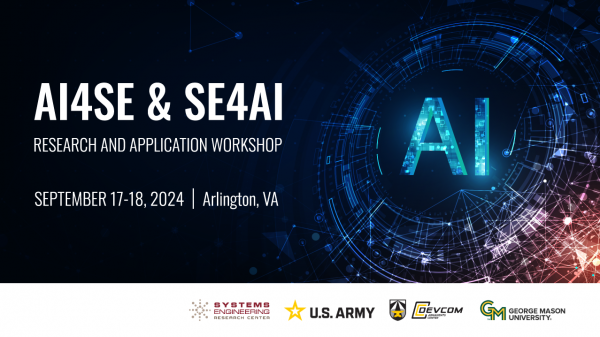September 17: Keynotes, Panels, and Other Presentations
Mr. Matthew Rose, Global Public Sector Industry Principal, Snowflake
US Army DEVCOM Armaments Center Perspective
Mr. Edward W. Bauer, Director of the Systems Engineering Directorate, US Army DEVCOM Armaments Center
Plenary Panel: The Need for Socio-technical System Testbeds for AI Enabled Systems
Moderator: Dr. Laura Freeman, Virginia Tech
September 17: SE4AI Track Safety Frameworks
Accountability for AI Enabled Systems Used in Critical Decision-making
NASA Langley Research Center
Navigating Uncertainty: Enhancing AI System Safety through the Integration of Systems Theory, Set Theory and R3+ Concepts
University of Alabama in Huntsville
What Can Aviation and Pharmaceuticals Teach Us About How to Set Up a System of Assurance for Different Types of AI-Enabled Systems?
George Washington University
Application of AI to Collision Risk Safety Analysis for the National Airspace System
September 17: SE4AI Track AI - "ilities"
Interpretable ML for Requirements Development
United States Military Academy
Using End-to-End Causal Inference to Assess AI-ML Classifier Health
Carnegie Mellon University Software Engineering Institute
Enhancing Trust in AI-Powered Situational Awareness Systems for US Army Ground Vehicles: A Holistic Approach to Explainability and Interpretability
Strategic Ai Services (SAS)
Integrating Responsible AI Principles into Systems Engineering Practices: A Holistic Approach for Safe and Reliable AI-Enabled Systems
September 17: SE4AI Track T&E of AI
Enhancing Testing & Evaluation of AI-Enabled DoD Systems Using MBSE
Multi-Fidelity Test and Evaluation of AI-Enabled Systems
Use of Predictive AI/ML Embedded in Lifecycle Systems Engineering to Support Testing of AI/ML Based Weapons Systems
Georgia Tech Research Institute
September 17: AI4SE Track AI for Design and Governance of Complex Systems
Accelerating Insertion of Warfighting Capability using GenAI Based Control Synthesis from Image
Software Engineering Institute at Carnegie Mellon University
Design of AI-Enabled Multi-Mode Logistics Planning System (M2ALPS) In Support of the Air Force Adaptive Basing Concept-of-Operations
Use of STPA for Analyzing Information Flows in Distributed Autonomous Systems
Stevens Institute of Technology
Guiding the Behavior of Complex Networked Systems using Multi-Agent Reinforcement Learning: Governance by Dynamic Balancing of Cooperation and Competition
September 17: AI4SE Track AI at the Enterprise Level
Responsible Use of AI to Improve Sustainability of Future Systems
AFC DEVCOM AvMC RAM Division
Rapid Intelligent Systems Engineering
Lockheed Martin – Advanced Technology Laboratories
The Use of Generative GenAI to Unlock Value from Defense ERP Business Systems
Large Language Models in Enhanced Electronic Warfare: Applications, Benefits, Limitations and Future Directions
Stevens Institute of Technology
September 17: AI4SE Track AI4SE in Digital Engineering
Reuse of Digital Engineering Models via Semantic Component Libraries
Systems Engineering Research Center
MBSE AI Platform for Productivity (MAPPy): Combining AI and Digital Engineering
Accelerating Semantic Digital Thread User Queries Using LLMs
September 18: Keynotes, Panels, and Other Presentations
Mr. Daniel Mahanty, Division Director for Learning, Civilian Protection Center of Excellence
Plenary Panel: Opportunities and Risks for Leveraging Generative AI to Support SE Processes
Moderator: Dr. Peter Beling, Virginia Tech
Dr. Missy Cummings, Professor and Director of Mason Autonomy and Robotics Center, George Mason University
SERC Perspective: Archimedes Workshop on Trustworthy AI
Dr. Zoe Szajnfarber, Professor, The George Washington University and SERC Chief Scientist
Dr. Peter Beling, Virginia Tech
September 18: SE4AI Track Human Autonomy Integration and Trust
Towards A Human-AI Collaboration Maturity Model (HAIC-MM) for Small and Medium-Sized Enterprises
Colorado State University
Understanding the Tradeoffs of Human-AI System Architecting
George Washington University
Addressing Challenges of Human-AI Teaming Experiments Using Naval AI Systems
Naval Information Warfare Center
PRODEC: A Method and Platform for Human Systems Integration of Human-AI Teams
FlexTech Chair, CentraleSupélec (Paris Saclay University & ESTIA)
September 18: SE4AI Track SE Methodologies for AI
A SE4AI Framework for the Systems Engineering of Autonomous Systems with a Focus on the Curation of Data across the Lifecycle
The University of Adelaide & Shoal Group
Model-Based Systems Engineering (MBSE) Approach to Develop an Artificial Intelligence Bill of Material (AIBOM) for AI System Compliance Verification
System Architecture for Recombinant AI (SARAI)
C5I Center at George Mason University
Tradeoff Analysis Using an Integrated Data-Driven and Model-Based Approach for the Design of Autonomous Robots
A Systems Engineering Methodology for Integrating Autonomy with System of Systems and Conducting Data-Driven Trade Study Analyses
September 18: AI4SE Track LLMs for SE Artifacts
Say What? Identifying the Impact of Prompt Technique on AI Generation of Systems Engineering Artifacts
LLM Co-pilots for Domain Specific Modeling Languages
Developing Concepts of Operations Using Multi-Step Tool Techniques with Large Language Models
NASA Langley Research Center
Systems Engineering Language Modeling Assistant
September 18: AI4SE Track AI-aided Systems Engineering and Design
Challenges of Trustworthy Human/AI Teaming in Long-running Relationships
National Institute of Standards and Technology
Towards a Work Systems View of Human AI Collaboration in Systems Engineering and Design: The Case of Conceptual Design with a ChatGPT Partner
George Washington University
Theoretical Feasibility of Graph Neural Networks for Augmented Intelligence in Systems Engineering
University of Alabama in Huntsville
AI Aided Design and Development for Space Systems
University of Southern California Information Sciences Institute
Using Large Language Models to Accelerate Development of Complex Systems
Virginia Tech National Security Institute

